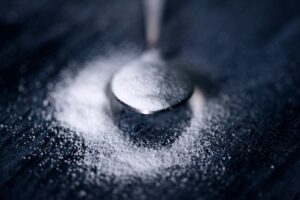Reactive Hypoglycemia
Reactive Hypoglycemia was Written by Dr. Diane Mueller
Maintaining stable blood sugar levels is crucial for overall
health, but particularly important for those with Lyme disease. Lyme disease is
a complex and chronic illness that affects the immune system, making it
difficult for the body to fight off infections. Fluctuating blood sugar levels,
particularly reactive hypoglycemia, can worsen inflammation in the body and
negatively impact those with Lyme disease. If you have reactive hypoglycemia, there is a cause. Inflammation of the nervous system is one possible cause. This can occur with Lyme Disease as well as other inflammatory conditions.

Reactive hypoglycemia occurs when blood sugar levels drop rapidly after eating, causing symptoms such as dizziness, weakness, shakiness, and even fainting. The overproduction of insulin, which leads to a sudden drop in blood sugar levels, is often the main cause of reactive hypoglycemia. The immune system’s overreaction to the rapid change in glucose and insulin levels leads to increased inflammation in the body.
Have Hypoglycemia, Lyme Disease or suspect you do?
We have helped thousands of people restore their health and quality of life by diagnosing and treating their root causes.
Inflammation is a common symptom of Lyme disease, and fluctuating blood sugar levels can worsen this inflammation. This occurs due to several mechanisms. Firstly, hypoglycemia causes an increase in the production of stress hormones such as cortisol and adrenaline, which activate the immune system and lead to increased inflammation. Secondly, hypoglycemia can lead to an increase in the production of cytokines, small proteins that play a critical role in the immune response and can cause inflammation. Finally, reactive
hypoglycemia can cause an increase in the production of reactive oxygen species, leading to oxidative stress and increased inflammation.
To prevent reactive hypoglycemia and reduce inflammation in
the body, it’s crucial for those with Lyme disease to focus on a diet that helps to maintain healthy blood sugar. Healthy fats, such as avocado and nuts, can also
help slow down the absorption of glucose. Protein, such as chicken or fish, can
help stabilize blood sugar levels and prevent sudden drops. It is very common for people to not eat enough protein.
In addition to a healthy diet, regular exercise can also
help prevent reactive hypoglycemia and reduce inflammation in the body.
Exercise helps to regulate blood sugar levels and increase insulin sensitivity,
which can reduce the risk of sudden drops. HIIT training is particularly useful for this!
Maintaining stable blood sugar levels is
critical for those with Lyme disease. Fluctuating blood sugar levels can worsen
inflammation in the body, and the mechanisms by which this occurs are
multifactorial. By avoiding refined carbohydrates and sugars, focusing on a
balanced diet, exercising regularly, and stabilizing blood sugar levels, those
with Lyme disease can reduce inflammation in the body and improve their overall
health. It’s essential to take care of your body and make healthy choices to
reduce the impact of Lyme disease and other chronic illnesses.
Nutrients & Botanicals and Reactive Hypoglycemia
In addition to proper diet and exercise, certain nutrients have been shown to be helpful for maintaining healthy blood sugar. These include the following:
Vitamin C and Vitamin E, when combined with chromium were shown to improve fasting glucose, HgA1C and insulin sensitivity.
Chromium itself has been shown to reduce elevated blood sugar levels but caution should be exercised with all hypoglycemic nutrients not to push blood sugar too low.
Magnesium is a commonly deficient nutrient and low levels have consistently been found in people with elevated insulin.
Cinnamon can help lower blood sugar levels and has also been shown to lower triglycerides, LDL cholesterol and total cholesterol.
Berberine is an herb commonly used for its anti-inflammatory and anti-diabetic properties. In addition to lowering blood sugar, berberine improves triglyerides, HbA1C fasting insulin and total cholesterol. The hypoglycemic effects of berberine are well established and may be useful in RH as well. The mechanism of action for berberine is not fully understood but one primary component appears to be stimulation of the GLUT4 receptor. Glucose transporter 4, or GLUT4 shuttles glucose out of the blood stream and into skeletal muscle, thereby lowering blood sugar.
Gynostemma is another herb with hypoglyemic properties. Although not as well researched as berberine, gynostemma has shown benefit in Type 2 diabetes and may be also useful in regulating blood sugar in RH. Gynostemma appears to work by inhibiting the PTP1B enzyme. Levels of PTP1B are inversely correlated with insulin sensitivity and obesity in mice.
For more information on Lyme Disease Treatment See our Blog Below
References
- Hofeldt, Fred D. “Reactive Hypoglycemia.” Metabolism 24.10 (1975): 1193-208. Web.
- “2014 National Diabetes Statistics Report.” Centers for Disease Control and Prevention. Centers for Disease Control and Prevention, 15 May 2015. Web. 12 May 2017.
- Açbay, Ãzer, Aykut Ferhat Ãelik, and Sadi GündoÄdu. “DoesHelicobacter Pylori-induced Gastritis Enhance Food-stimulated Insulin Release?” Digestive Diseases and Sciences41.7 (1996): 1327-331. Web.
- Açbay, Ã., P. Kadioglu, A. Celik, and S. Gündogdu. “Helicobacter Pylori-induced Gastritis May Contribute to the Occurrence of Postprandial Symptomatic Hypoglycemia.” Gastroenterology 114 (1998): n. pag. Web.
- Brown, L. M. “Helicobacter Pylori: Epidemiology and Routes of Transmission.” Epidemiologic Reviews 22.2 (2000): 283-97. Web.
- Sonnenberg, Amnon, Richard H. Lash, and Robert M. Genta. “A National Study of Helicobactor Pylori Infection in Gastric Biopsy Specimens.” Gastroenterology 139.6 (2010): n. pag. Web.
- Capdor, Jasmine, Meika Foster, Peter Petocz, and Samir Samman. “Zinc and Glycemic Control: A Meta-analysis of Randomised Placebo Controlled Supplementation Trials in Humans.” Journal of Trace Elements in Medicine and Biology 27.2 (2013): 137-42. Web.
- Singh, Kshetrimayum Birla. “Long Term Excessive Zn Supplementation Induced Oxidative Stress in Wistar Rats Fed on Semi-Synthetic Diet.” Food and Nutrition Sciences 03.06 (2012): 724-31. Web.
- Niu, Xia, Ruyue Xiao, Na Wang, Ziwei Wang, Yue Zhang, Qing Xia, and Xiaoda Yang. “The Molecular Mechanisms and Rational Design of Anti-Diabetic Vanadium Compounds.” Current Topics in Medicinal Chemistry 16.8 (2015): 811-22. Web.
- Boulassel, Brahim, Nouredine Sadeg, Olivier Roussel, Martine Perrin, and Hafid Belhadj-Tahar. “Fatal Poisoning by Vanadium.” Forensic Science International 206.1-3 (2011): n. pag. Web.
- Lai, Ming-Hoang. “Antioxidant Effects and Insulin Resistance Improvement of Chromium Combined with Vitamin C and E Supplementation for Type 2 Diabetes Mellitus.” Journal of Clinical Biochemistry and Nutrition 43.3 (2008): 191-98. Web.
- Jain, Sushil K., and Krishnaswamy Kannan. “Chromium Chloride Inhibits Oxidative Stress and TNF-α Secretion Caused by Exposure to High Glucose in Cultured U937 Monocytes.” Biochemical and Biophysical Research Communications 289.3 (2001): 687-91. Web.
- Garg, Neetika, Janice Weinberg, Sandeep Ghai, Gitana Bradauskaite, Matthew Nuhn, Amitabh Gautam, Nilay Kumar, Jean Francis, and Joline L. T. Chen. “Lower Magnesium Level Associated with New-onset Diabetes and Pre-diabetes after Kidney Transplantation.” Journal of Nephrology 27.3 (2014): 339-44. Web.
- Wang, Jinsong, Gioia Persuitte, Barbara Olendzki, Nicole Wedick, Zhiying Zhang, Philip Merriam, Hua Fang, James Carmody, Gin-Fei Olendzki, and Yunsheng Ma. “Dietary Magnesium Intake Improves Insulin Resistance among Non-Diabetic Individuals with Metabolic Syndrome Participating in a Dietary Trial.” Nutrients 5.10 (2013): 3910-919. Web.
- Hata, A., Y. Doi, T. Ninomiya, N. Mukai, Y. Hirakawa, J. Hata, M. Ozawa, K. Uchida, T. Shirota, T. Kitazono, and Y. Kiyohara. “Magnesium Intake Decreases Type 2 Diabetes Risk through the Improvement of Insulin Resistance and Inflammation: The Hisayama Study.” Diabetic Medicine 30.12 (2013): 1487-494. Web.
- Rumawas, Marcella E., Nicola M. Mckeown, Gail Rogers, James B. Meigs, Peter W.f. Wilson, and Paul F. Jacques. “Magnesium Intake Is Related to Improved Insulin Homeostasis in the Framingham Offspring Cohort.” Journal of the American College of Nutrition 25.6 (2006): 486-92. Web.
- Khan, A., M. Safdar, M. M. Ali Khan, K. N. Khattak, and R. A. Anderson. “Cinnamon Improves Glucose and Lipids of People With Type 2 Diabetes.” Diabetes Care 26.12 (2003): 3215-218. Web.
- Zhang, Yifei, Xiaoying Li, Dajin Zou, Wei Liu, Jialin Yang, Na Zhu, Li Huo, Miao Wang, Jie Hong, Peihong Wu, Guoguang Ren, and Guang Ning. “Treatment of Type 2 Diabetes and Dyslipidemia with the Natural Plant Alkaloid Berberine.” The Journal of Clinical Endocrinology & Metabolism 93.7 (2008): 2559-565. Web.
- Huyen, V. T. T., D. V. Phan, P. Thang, N. K. Hoa, and C. G. Ãstenson. “Antidiabetic Effect OfGynostemma PentaphyllumTea in Randomly Assigned Type 2 Diabetic Patients.” Hormone and Metabolic Research 42.05 (2010): 353-57. Web.
- Elchebly, M. “Increased Insulin Sensitivity and Obesity Resistance in Mice Lacking the Protein Tyrosine Phosphatase-1B Gene.” Science 283.5407 (1999): 1544-548. Web.
- Broussard, Josiane L., David A. Ehrmann, Eve Van Cauter, Esra Tasali, and Matthew J. Brady. “Impaired Insulin Signaling in Human Adipocytes After Experimental Sleep Restriction.” Annals of Internal Medicine 157.8 (2012): 549. Web.
Free Lyme/Mold Webinar: "Why Am I Still Sick?"
Have Lyme Disease or suspect that you do?
We have helped thousands of
people restore their health
and quality of life by diagnosing
and treating their Lyme Disease.
“Dr. Mueller’s approach to medicine is refreshing! There is only so much you can do with western medicine and in my life I was needing a new approach. By addressing the whole body, nutritional diet factors, environmental factors, blood work, and incorporating ideas I had not previously known, I was able to break through with my conditions. I am not only experiencing less pain in my life, but through the process of healing guided by Dr. Diane Mueller, I am now happy to say I have more consciousness surrounding how I eat, what to eat and when things are appropriate. Living by example Dr. Mueller has a vibrancy that makes you want to learn and know more about your body and overall health. I highly recommend her to anyone looking for new answers, a new approach to health, or in need of freedom from pain and limitations.”
-Storie S.
Kihei, HI
Lyme Disease is Often Misdiagnosed as Fibromyalgia, Chronic Fatigue, Depression,
or Other Illnesses
Have Mold Illness or Lyme Disease or suspect you do?
We have helped thousands of people restore their health and quality of life by diagnosing and treating their Mold Illness, Lyme Disease and other root causes.


